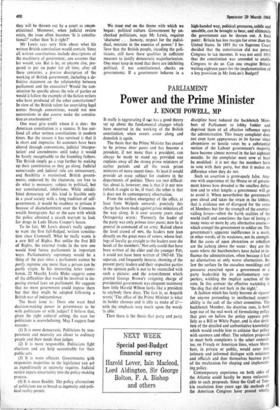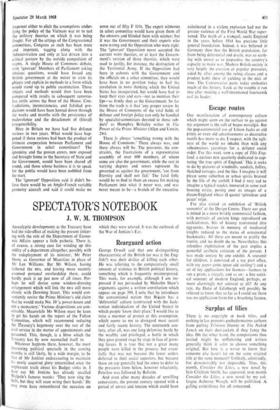Power and the Prime Minister
PARLIAMENT J. ENOCH POWELL, MP
It really is aggravating if ose has a good theory set up about the fundamental changes which have occurred in the working of the British constitution, when events come along and demolish it again.
The thesis that the Prime Minister has ceased to be primus inter pares and has become a president, if not more than a president, can always be made to stand up, provided one explains away all the strong prime ministers of earlier periods and all the weak prime ministers of more recent times. At least it would provide an essay subject for students in the departments of politics. There are two difficul- ties about it, however; one is that it is not new (which it ought to be, if true); the other is that it does not fit contemporary observation.
From the earliest emergence of the office, at least from Walpole onwards, precisely this charge has been made against prime ministers all the way along. It is over seventy years since Ostrogorsky wrote: 'Formerly the leader of the party was only primus inter pares; now he is general in command of an army. Raised above the level crowd of MPS, the leaders now lean directly on the great mass of voters, whose feel- ings of loyalty go straight to the leaders over the heads of the members.' Not only could that have been written of the elder and the younger Pitt; it could not have been written of 1967-68. The separate, and frequently inverse, showing of the present party leaders and their respective parties in the opinion polls is not to be reconciled with such a picture; and the astonishment which greeted George Brown's resigning charge of presidential government was eloquent testimony how little Harold Wilson looks like a president to anybody these days. The fact is, as Asquith wrote: 'The office of the Prime Minister is what its holder chooses and is able to make of
with the emphasis very much upon the words is able.'
Then there is the thesis that party and party discipline have reduced the backbench Mem- bers of Parliament to lobby fodder and deprived them of all effective influence upon the administration. This hoary complaint does not even have appearances in Its favour since abstentions or hostile votes by a substantial section of the Labour government's majority have become almost normal in the last eighteen months. So the complaint must now at least be modified: it is not that the members have to vote with their party, but that it makes no difference when they do not.
Such an assertion is grotesquely false. Any- one with experience of the House or of govern- ment knows how dreaded is the smallest defec- tion and to what lengths a government will go to avoid it. When nevertheless the government goes ahead and takes the strain in the lobbies, that is evidence not of disregard for the votes of Members but for the strength of the counter- vailing forces—often the harsh realities of the world itself .and sometimes the fear of losing as many votes or more by any alternative course— which compel the government to soldier on. The government's apparent indifference is a mark, in other words, of its weakness, not its strength. But the cases of open abstention or rebellion are the iceberg above the water : they are the cases where the backbenchers have failed to in- fluence the administration, often because it had no alternatives or only worse alternatives. Be- low the surface lie the ceaseless mouldings and pressures exercised upon a government or a party leadership by its parliamentary sup- porters, wielding the implicit sanction of the vote. In this context the effective watchdog is 'the dog that did not bark in the night.' A fashion which has lately become de rigueur for anyone pretending to intellectual respect- ability is the cult of the select committee. The backbench Member, the doctrine runs, is both kept out of the real work of formulating policy that goes on before the policy appears pub- licly as a Bill or White Paper, and is also desti- tute of the detailed and authoritative knowledge which would enable him to criticise that policy with sureness and effect. The solution proposed to meet both complaints is the select commit- tee, on French or American lines, where Mem- bers, in private or public, would enter into intimate and informed dialogue with ministers and officials and thus themselves become part of the mechanism for shaping and implement- ing policy. Contemporary experience on both sides of the Atlantic could hardly be more unfavour- able to such proposals. Since the Gulf of Ton- kin resolution four years ago the methods of the American Congress have proved wholly Impotent either to elicit the assumptions under- lying the policy of the Vietnam war or to test the military theories on which it was being fought. For all the sittings of the Congressional committees, Congress as such has been mute and impotent, tagging along with the Administration and only at last driven into a critical posture by the outside compulsion of events. A single House of Commons debate, ith 'ignorant' Members of Parliament asking obvious questions, would have forced any British government at the outset to state its objects and explain its methods in a form which would stand up to public examination. Those objects and methods would then have been compared with results in subsequent remorse- less strife across the floor of the House. Con- tradictions, inconsistencies, and falsified pre- dictions would have been hunted down through the weeks and months with the persistency of malevolence and the detachment of (literal) irresponsibility.
Here in Britain we have had five defence reviews in two years. What would have hap- pened if those reviews had been the product of intimate cooperation between Parliament and Government in select committees? The ignominy and the proven errors, now exposed and brought home to the Secretary of State and the Government, would have been shared all round, and those whose business it is to speak for the public would have been nobbled from the start.
The 'ignorant' Opposition said it didn't be- lieve there would be an Anglo-French variable geometry aircraft and said it could make no sense out of fifty F Ills. The expert witnesses in select committee would have given them all the answers and blinded them with science; but it was the Government and their experts who were wrong and the Opposition who were right. The 'ignorant' Opposition never accepted the current NATO theories, or at least the Govern- ment's version of those theories, which were used to justify, for instance, the destruction of the Territorial Army. If the Opposition had been in cahoots with the Government and the officials on a select committee, they would have been in no position today to hail the revolution in NATO thinking which the United States has inaugurated, but would have had to keep their eyes and ears—not to mention their lips—as firmly shut as the Government. So far from the truth is it that 'any proper review by the House of Commons of the vital fields of defence and foreign Policy can only be handled by specialist-committees devoted to those sub- jects' as Humphry Berkeley writes in The Power of the Prime Minister (Allen and Unwin, 24s).
There is always 'something wrong with the House of Commons.' There always was, and there always will be. The pressures, the con- straints, the frustrations of a representative assembly of over 600 members, of whom some are also the government, while the rest in varying degrees and senses represent the governed as against the government, 'are from Eternity and shall not fail.' The fatal folly would be to find in them an excuse for making Parliament into what it never was, and was never meant to be—a branch of the executive.







































 Previous page
Previous page